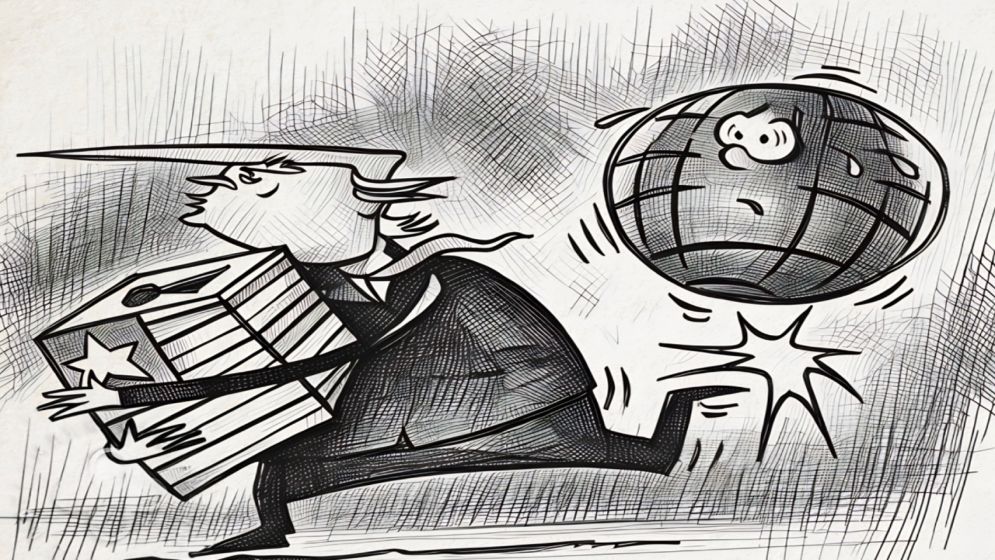Trump, tariff and tomorrow

In the wake of Jaffry Sach’s influential book The Price of Civilization, which has been widely read and discussed, many Americans have come to a stark realization: globalization has not delivered the benefits they were promised.
Just as the world at large has suffered from the uneven rewards of globalization, so too has American society. Sach’s argument is compelling—the American government, he asserts, has been captured by corporate interests, sacrificing its duty to serve the public in favor of a corporate-driven agenda.
This, in turn, has helped foster a global economy built on artificial supply rather than actual demand. Corporations are expected to grow relentlessly, with profits reaching sky-high levels year after year, irrespective of the broader economic downturns or recessions.
And the pressure on nations to morph into consumer societies—insatiable and ever-hungry—remains unyielding.
Then came Donald Trump’s second term. With his executive power, he thrust the world into a period marked by some of his most controversial decisions on war and trade. A trade war—largely deemed detrimental by the global community—was only the beginning.
Yet, beneath these conflicts lies a deeper, looming war: one that seeks to sustain America's internal economy in a world where the West no longer holds all the cards.
Protests erupt both within the United States and abroad, but the more profound question remains: why did the American people elect him for a second term? Is it a sign of irrationality? Or is it a reflection of their collective sense of relative deprivation?
As the world grapples with the shifting global economic landscape, it seems that Trump and his administration may be aware of the futility in trying to maintain a unipolar world order. The prolonged war in Ukraine, for instance, only serves to hurt both Europe and Russia, leaving the United States—despite its fractured state—vulnerable in the economic game.
In contrast, China patiently watches as the West falters, positioning itself to seize the mantle of global power in the decades to come.
In this context, Trump’s decisions make sense. The Ukraine-Russia war may end to preserve Europe, allowing Russia to regain its place in global affairs alongside the United States. Meanwhile, the Middle East may see a resurgence of conflict, strategically keeping energy-hungry countries like China in a perpetual struggle.
As for the trade war, while it threatens to destabilize the global economy, it may also light the way for America to reclaim its former glory—a call Trump has made repeatedly: “Make America Great Again.”
-67f62eb593af2.png)
The faults in our global economic system
However, the greatest flaw in today’s global economic system is rooted in the abandonment of the mercantile approach that once characterized it.
The current liberal economic order, focused primarily on unlimited growth and profit, has forgotten its primary obligation—to ensure the prosperity of citizens. The pursuit of unchecked profit, rather than sustainable development, has led to disastrous consequences.
Western economies outsourced the production of goods to reduce costs, shifting focus to high-end, high-profit items and boasting GDP figures. The result has been a severe crisis of employment and inflation in many Western countries, leaving vast swaths of the population without stable work or financial security.
In stark contrast, China has maintained tight control over its economy. There are no widespread problems of unemployment or inflation, and the state takes responsibility for meeting the basic needs of its people.
Unlike in the West, where wealth can create supra-state entities beyond the reach of the government, China ensures that no individual can accumulate such vast wealth as to challenge the state’s authority.
While the West struggles with economic instability, China is largely immune, having crafted a system that values stability and national cohesion over unrestrained growth.
The question is not whether the global economy will survive this turbulence but whether America will learn from the lessons of the past. Can the U.S. sustain its economic strength, while recalibrating its approach to globalization?
Or will the continued pursuit of corporate-driven profits doom the nation to a future of inequality and stagnation? Perhaps it is time for a new vision—one that aligns the interests of the state with the well-being of its citizens, and not just the relentless growth of corporations.
The economic models that have defined Western economies for decades—particularly the rent-seeking model advocated by John Maynard Keynes—have failed to deliver long-term stability and prosperity.
Keynes's approach, which relied heavily on government investment through public borrowing to sustain demand in the face of overproduction by corporations, created enormous public debt and fiscal deficits.
While it succeeded in breaking the underemployment equilibrium, it did little to address inflation, especially in the West.
Meanwhile, Milton Friedman's monetarist theories, which emphasized controlling inflation through an expanded money supply, also fell short of sustaining economic growth.
Both models, born out of the depression-era context of the 1930s, failed to adapt to the new realities of a globalized economy dominated by corporate interests.
-67f62ed4090f5.png)
Obsession that led to economic imbalance
The obsession with relentless growth—driven solely by corporate profit motives—has led to an economic imbalance that continues to plague Western nations.
The United States, for example, is burdened by a staggering $33 trillion public debt and a $1 trillion budget deficit, a crisis that fueled the rise of Donald Trump and his administration's aggressive stance on trade and fiscal policy.
Trump's decision to initiate a tariff war and projects like DOSE aimed at reducing government spending were direct responses to the looming threat of economic disaster.
These actions, while controversial, reflect a deeper truth: the current economic models in the West are no longer working.
So, what lies ahead? Are we heading toward another Great Depression like that of the 1930s, or is there a viable alternative model—one that could provide resilience and sustainability to the global economy?
The answer may lie in a return to a more rule-based international order, one that respects national sovereignty and prioritizes the needs of individual nations over the geopolitical and economic euphoria of colonialism and imperialism.
This approach would need to balance global cooperation with the preservation of local autonomy and self-sufficiency.
A key part of this shift lies in addressing the failures of the current global economic system, especially in the realms of healthcare and consumer demand.
The COVID-19 pandemic exposed the weaknesses of global supply chains and the dangers of an over-reliance on multinational corporations.
A future economic system must prioritize global healthcare infrastructure to prevent future pandemics while also focusing on the real needs of consumers—rather than succumbing to the relentless push of manufacturers and their profit-driven agendas.
Perhaps what is needed is not a complete rejection of past economic models, but a synthesis—a blending of the mercantilist principles of old with the lessons of contemporary liberalism.
This hybrid approach could create a more balanced world economy, one that is not defined as liberal or illiberal, but as practical and responsive to the needs of its people.

Where lies the solutions?
In this vision, businesses would grow in a balanced way, supporting other nations where they are lacking, rather than pursuing unchecked profits at the expense of social and environmental wellbeing.
The unchecked power of large corporations, acting through supra-state entities, must be reined in. The state must reclaim its legitimate role in regulating the market and controlling the invisible hand that often works against the interests of ordinary citizens.
Business, in this new model, would no longer be a mere profit-seeking venture, but a means of contributing to the collective good.
The pleasure derived from business would come not from bottom-line profits alone, but from creating thriving communities, ensuring that citizens are happy and prosperous within their own nations, surrounded by their families and culture, rather than living as second-class citizens in foreign lands.
Prosperity and happiness should not be confined to the West alone. Every nation should have the opportunity to thrive, to find contentment in smaller, more sustainable models of growth.
The future of global economics, including Trump's tariff policies and the broader geopolitical shifts, could ultimately prove to be a boon rather than a bane.
In challenging the global capital markets controlled by mega-corporations, there may be an opportunity to forge a new path forward—one rooted in fairness, sovereignty, and the well-being of all citizens, not just the profit margins of the few.
—-
Brigadier General (Retd) AF Jaglul Ahmed, ndc, psc, Phd is a regular contributor in national daily’s

